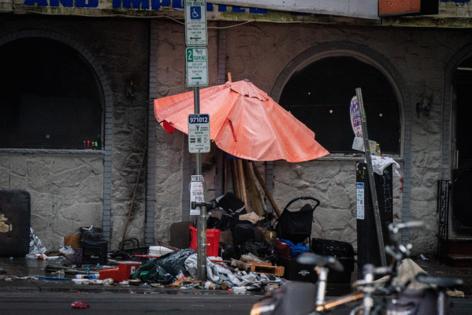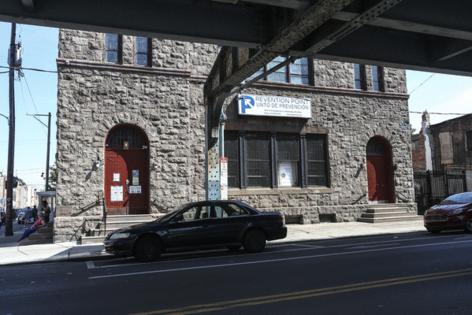In City Hall's actions in Philly's Kensington neighborhood, harm-reduction workers see efforts to curtail their work
Published in News & Features
PHILADELPHIA — Over the last year in Kensington, at the epicenter of Philadelphia’s opioid crisis, elected officials cut funding for a syringe exchange, urged a landlord to stop renting space to a harm-reduction program, and advocated for restrictions on how and where medical providers operate.
Amid intense debate during a new mayor’s first term, Kensington politicians have argued that some neighborhood programs for people with addiction are not “good neighbors” and place undue burdens on the area’s permanent residents.
But others providing services to people in addiction see a concerted effort to curtail their work, and they say City Hall’s approach will only worsen the crisis and further harm the neighborhood.
Prevention Point, the Kensington-based public health organization, is particularly in the crosshairs of the new restrictions. This summer, it lost about $1 million in city funding to provide sterile syringes. Recently, the city zoning board ruled that the nonprofit could host only one medical provider at a time at its Kensington offices, which would effectively change how it has long operated.
Another harm-reduction group, Savage Sisters, is now operating from a van after losing its storefront in Kensington. This spring, City Councilmember Quetcy Lozada, who represents parts of the neighborhood, urged a Kensington landlord not to renew the lease.
Now the council is considering new limits on outreach operations that provide medical care and distribute supplies from vehicles. A number of providers who serve people with addiction, including Temple Health and Project HOME, utilize mobile clinics to reach people who wouldn’t otherwise seek medical care at a traditional doctor’s office.
The bill would prohibit them from parking on residential streets, near schools, or within 100 feet of one another in the neighborhood, which is home to one of the largest open-air drug markets in the country.
A vote has been delayed while Council members negotiate the particulars with providers, community members, and the mayor.
“First it was Savage on the chopping block, now it’s Prevention Point and the mobile services,” Savage Sisters founder Sarah Laurel said.
Cuts to programs for people with addiction
Mayor Cherelle L. Parker has said she supports comprehensive public health strategies to address the overdose epidemic, and has committed $100 million in funding toward a drug treatment center and shelter to be constructed near the city’s jail complex.
But shortly into her first term, she said the city would no longer use settlement funds from lawsuits against opioid manufacturers to pay for sterile syringe exchanges and cut the program at Prevention Point, the city’s only brick-and-mortar exchange. Such services should be privately funded instead, she has said.
In response, Prevention Point has “shrunk” its schedule for handing out sterile syringes, which are crucial for preventing the spread of blood-borne illnesses such as HIV and hepatitis C, according to the group’s lead executive officer, Silvana Mazzella.
In the meantime, “we have continued with reduced resources and enhanced fundraising activities from private funding,” Mazzella said in an email.
On top of those cuts, city officials informed the nonprofit in early 2024 that its zoning did not permit several doctors to see patients simultaneously, as had long been allowed. The nonprofit submitted a formal application to host more providers, which zoning officials denied in early December.
The ruling could delay medical care for clients, the organization says, and it plans to appeal the decision.
Tensions around harm-reduction work in Kensington
Now a proposal to restrict where mobile services can operate could make it even harder for people with addiction to get medical care, advocates say.
Lozada, who sponsored the mobile services bill, said she recognizes the necessity of mobile providers but wants them to follow a more organized, structured schedule.
Community members have complained for years about people who receive services from mobile clinics lingering on their blocks, in some cases sitting on residents’ steps and refusing to leave, she said.
Council members are viewing the addiction crisis as a “trash and litter problem” instead of a public health issue, said Kelsey Leon, who works with the Kensington mutual aid organization Community Action Relief Project.
At one point this summer, “I had two police cars with three lieutenants and two other foot cops pull up on me for the alleged crime of handing someone a bottle of water,” said Leon, who had taken water bottles to McPherson Square Park, where people with addiction often congregate.
At-large Councilmember James Harrity, who lives in Kensington, said smaller groups who come to the neighborhood to provide outreach do not coordinate with other groups. Sometimes, he said, they do not clean up the blocks where they park afterward.
He said he also didn’t want residents to see in public places people receiving care for serious wounds caused by xylazine, or tranq, the animal tranquilizer that has contaminated most of the city’s illicit opioids.
The council has discussed using a city-owned lot to offer a “one-stop shop” for health-care services, wound care, and food distribution, Lozada said, adding and that the neighborhood needs “a combination of mobile services, inside services, hospital services, prevention and recovery services.”
But the city has not always followed through on pledges to bolster services, along with restrictions.
In May, the clearing of a large encampment of people with addiction on Kensington Avenue raised concerns among harm-reduction workers.
City officials had said the clearing would be led by outreach teams, but no city social service workers were on the scene when police arrived in the early morning and escorted encampment residents away. The city said that ultimately 59 people from the encampment entered shelters or treatment, including 31 on the day of the sweep.
“Since the sweeps, things have been more tense,” Leon said.
‘We need to be safeguarding this work’
Until it lost its lease, Savage Sisters provided showers, food, and basic wound care inside a storefront, out of the view of passersby.
Since the loss of the lease, Savage Sisters has been conducting mobile outreach outside in Kensington.
“Our reach and our ability to serve more people has increased. I just don’t think it’s the quality we had with a brick-and-mortar building,” said Laurel, the organization’s founder.
Prevention Point staff agree “brick-and-mortar addiction care facilities are the best practice,” Mazzella said. But Prevention Point’s mobile operations can help engage with people who might be reluctant to seek care in traditional medical settings, Mazzella said, adding that the organization has met with Council members about the mobile services bill.
“This mobile care is critical, because we can meet people where they are and build the trust required to help them,” she said.
_____
©2024 The Philadelphia Inquirer. Visit inquirer.com. Distributed by Tribune Content Agency, LLC.










Comments